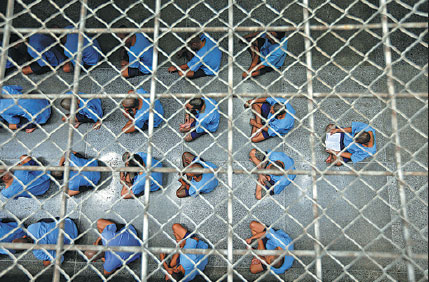Soaring prison population prompts nation to re-think 'lost' drug war
Somsak Sreesomsong was 18 when he was jailed for selling illegal drugs. Now, turning 30, he is not yet half way through his 33-year sentence at Bangkok's high-security Klong Prem prison.
Somsak was "just a kid, not a big-time dealer", his older brother Panit told Reuters after a visit to the jail. "We're also serving time, waiting for him to get out so he can help the family."
More than a decade after Thailand declared a "war on drugs", the country is admitting defeat. As the prison population soars, Justice Minister Paiboon Koomchaya told Reuters he was looking at changes to the country's draconian drug laws.
"I want to de-classify methamphetamine but Thailand is not ready yet," said Paiboon, meaning downgrading the drug, popularly known as "meth", from a Category 1 substance, which would reduce jail time for possession or dealing.
Use of methamphetamine is spiralling across Southeast Asia, and authorities are struggling to respond.
In the Philippines, which has some of the highest rates of "meth" use, police killings of drug suspects have spiked since the swearing-in of President Rodrigo Duterte, elected on a platform of harsh measures to wipe out drug crime.
Myanmar, the source of much of the drugs flooding through the region, is bracing for an explosion in domestic use.
Overall, drugs supply in Southeast Asia, especially of methamphetamine, is at a record level, according to the United Nations Office on Drugs and Crime (UNODC).
Harsh punishments
In common with much of the region, Thailand's criminal justice system treats drug offenders harshly.
Producing and trading in Category 1 drugs, which also include heroin, MDMA - the main chemical for ecstasy pills - and LSD, is punishable by death or life imprisonment.
Klong Prem is home to 6,267 inmates serving sentences that range from 15 years to life, with 64 percent convicted of drug-related crimes.
A typical cell measures 1.5 x 3 meters and sleeps five inmates, side-by-side on dark blue mattress on the floor.
"Some of the men, especially the foreign prisoners, are pretty big, so it's a squeeze for them," said one prison guard.
Lengthy sentences for drug offenses are part of the reason why Thai jails struggle with chronic overcrowding, according to both Justice Minister Paiboon and UN experts.
Thailand has approximately 40 percent of the Association of Southeast Asian Nations' prison population, despite having only 10 percent of the bloc's total population, the UNODC says.
Paiboon, an army general and senior member of the government, said in an interview that Thailand would build more prisons, including 17 temporary jails for prisoners who have served at least a third of their sentence.
He added that his priority was to tackle drug trafficking and addiction - an ambitious plan in a country where a record number of people use methamphetamines.
|
Inmates sit on the floor during an inspection visit in the longterm sentence zone inside Klong Prem highsecurity prison in Bangkok,Thailand on July 12. Jorge Silva / Reuters |



















